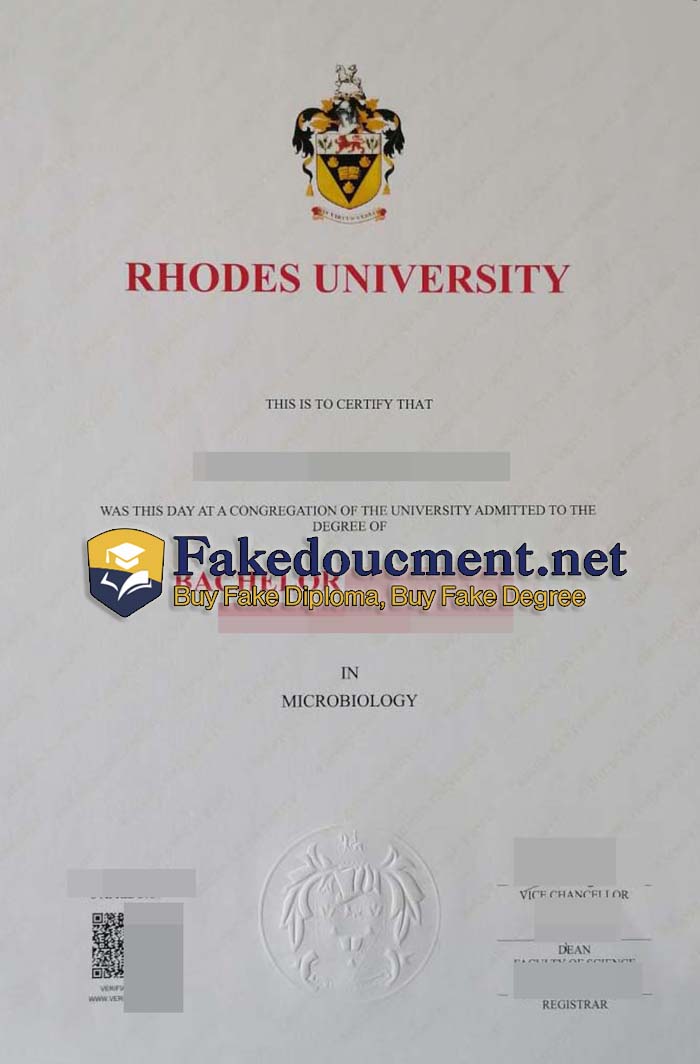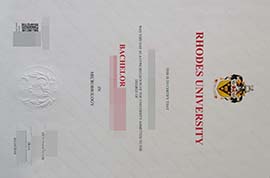
Where to order a realistic Rhodes University degree certificate online? Why people would like to buy a realistic Rhodes University diploma certificate online? The best way to buy a realistic Rhodes University degree certificate online?
Rhodes University is a public university located in Grahamstown, South Africa. It was founded in 1904 and is one of the oldest universities in the country. The university is named after Cecil Rhodes, a British imperialist and politician.
Rhodes University is known for its strong emphasis on academic excellence, a liberal arts education, and research. It offers a wide range of undergraduate and postgraduate programs across various faculties, including Arts, Sciences, Commerce, Education, and Law.
The campus is known for its beautiful architecture and picturesque setting, and it hosts a vibrant student life with numerous cultural and sporting activities. The university has a reputation for fostering critical thinking and social responsibility among its students.
If you have any specific questions about Rhodes University or need more detailed information, feel free to ask!
Established in 1904, Rhodes University is the province’s oldest university, and it is the sixth oldest South African university in continuous operation, being preceded by the University of the Free State (1904), University of Witwatersrand (1896), University of South Africa (1873) as the University of the Cape of Good Hope, Stellenbosch University (1866) and the University of Cape Town (1829). Rhodes was founded in 1904 as Rhodes University College, named after Cecil Rhodes, through a grant from the Rhodes Trust. It became a constituent college of the University of South Africa in 1918 before becoming an independent university in 1951.
The university had an enrollment of over 8,000 students in the 2015 academic year, of whom just over 3,600 lived in 51 residences on campus, with the rest (known as Oppidans) taking residence in digs (off-campus residences) or in their own homes in the town.
Although a proposal to found a university in Grahamstown had been made as early as 1902, financial problems caused by the Frontier Wars in Albany prevented the proposal from being implemented. In 1904 Leander Starr Jameson issued £50 000 preferred stock to the university from the Rhodes Trust. With this funding Rhodes University College was founded by an act of parliament on 31 May 1904.
University education in the Eastern Cape began in the college departments of four schools: St. Andrew’s College; Gill College, Somerset East; Graaff-Reinet College; and the Grey Institute in Port Elizabeth. The four St Andrew’s College professors, Arthur Matthews, George Cory, Stanley Kidd and G. F. Dingemans became founding professors of Rhodes University College.
At the beginning of 1905, Rhodes moved from cramped quarters at St Andrew’s to the Drostdy building, which it bought from the British Government. Rhodes became a constituent college of the new University of South Africa in 1918 and it continued to expand in size. When the future of the University of South Africa came under review in 1947, Rhodes opted to become an independent university.
Rhodes University was inaugurated on 10 March 1951. Sir Basil Schonland, son of Selmar Schonland, became the first chancellor of his alma mater, and Dr. Thomas Alty the first vice-chancellor. In terms of the Rhodes University Private Act, the University College of Fort Hare was affiliated to Rhodes University. This mutually beneficial arrangement continued until the apartheid government decided to disaffiliate Fort Hare from Rhodes.
The Rhodes Senate and Council objected strongly to this, and to the Separate University Education Bill, which they condemned as interference with academic freedom. However, the two bills were passed, and Fort Hare’s affiliation to Rhodes came to an end in 1959. Nevertheless, in 1962 an honorary doctorate was conferred on the state president, C. R. Swart, who (as Minister of Justice after 1948) had been responsible for the repression of opposition political organisations. The award caused the resignation of the chancellor, Sir Basil Schonland, although his reasons were not made public at the time.






